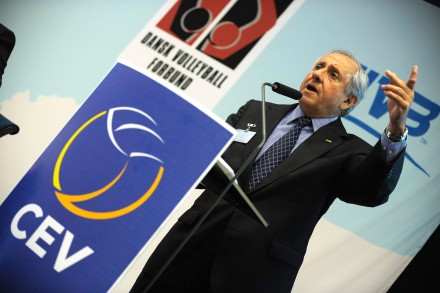
André Meyer
“I have to congratulate Mr. Meyer for the impressive figures he has showed. Europe’s success is well deserved as they have worked hard to achieve all this” he said. “However, our goal shall be to make sure that Volleyball achieves the same results all over the world. Our priority is to expand our horizons and search for additional markets. We are normally told that Volleyball is the second most popular sport in the world after soccer but this is not real. We still have to work a lot to have a global market. In the past ten years only 5 countries have won gold at the World Championships in Volleyball and Beach Volleyball. This is not enough and we have to adopt a different approach in order to make sure that the sport does not stop developing and we finally have a product to sell to the market”.
President Graça touched also upon corporate governance and the re-structuring of the FIVB headquarters that is undergoing in Lausanne. “Your administration must be completely transparent and you have to delegate power by creating a series of units similarly to what is done in any large company”.
Dr. Graça did also recall the work he did in order to turn the inaugural Beach Volleyball Continental Cup into reality. “We helped the Continental Confederations by educating their respective Beach Volleyball Coordinators and it was amazing to see how many countries got involved. We just had 35 nations whose teams were starring on the FIVB World Tour but in the end we had 143 that participated in the Continental Cup. We will be supporting the next edition with 2.5 million $ where we will once more used that country vs. country system that is very much liked also by TV”.
When it comes to development, also in Europe, the support by FIVB is very much needed, especially by sending professional coaches to up-and-coming countries. Dr. Graça recalled the case of Vanuatu, an archipelago in Oceania whose ladies went close to qualifying for the 2012 Olympic Beach Volleyball tournament after they started working with an Australian coach. “It is important to educate coaches and send those that are qualified to teach people in developing countries. It is also necessary to have friendly matches; results are not that important, because this is a learning-by-doing process similar to what Brazil did many years ago playing Volleyball powerhouses like Bulgaria or Japan. Even if you lose in straight sets this is not important, because we shall adopt a long-term perspective, so results will come though not immediately. We have started a special program for countries in North Africa where Italy is sending coaches there and something similar shall be done by the Russian Federation with former Soviet Republics in Central Asia and in the Caucasus region. A similar project sees Poland share their knowledge and expertise with neighboring countries such as Belarus, Latvia, Lithuania, and Estonia”.
The FIVB President then touched upon the World Championships coming up next year in Poland (men) and Italy (women). A special promotional campaign will start soon so as to attract fans, media, and sponsors from all over the world. Technology is also a theme: “I am very happy with the development and adoption of the challenge system so that the fate of a Championship won’t be determined by a mistake. However, it is also about communication and our general cooperation with the media. Our activities will be evaluated by an external auditor so that we can correct the mistakes that were made up to now. The social media are a reality that we have to exploit in order to attract more and more people, especially young boys and girls, to our sport. We also have to change our approach with the Olympic family after we missed that connection for 25 years. We have to exploit the Olympic solidarity program to support and finance the development activities that I have been presenting. As far as communication is concerned, TV and marketing are another priority. Two senior international experts have joined the FIVB as advisors, thereby helping our Marketing and TV Department to support the new FIVB vision”.
Another goal is to simplify the rules of the game and to find a certain consistency between Volleyball and Beach Volleyball. “Sponsors are also much needed because 90% of our income comes from TV rights and we have to find a balance with sponsorship agreements”.
To finish his addresss the FIVB President said: “We have a long way to go; I know many people are working hard and I invite Europe to help the other Confederations because you have the expertise and know how to support their development. FIVB needs each one of you to work for the good of Volleyball all around the world”.
To read more similar articles click on Latest news.